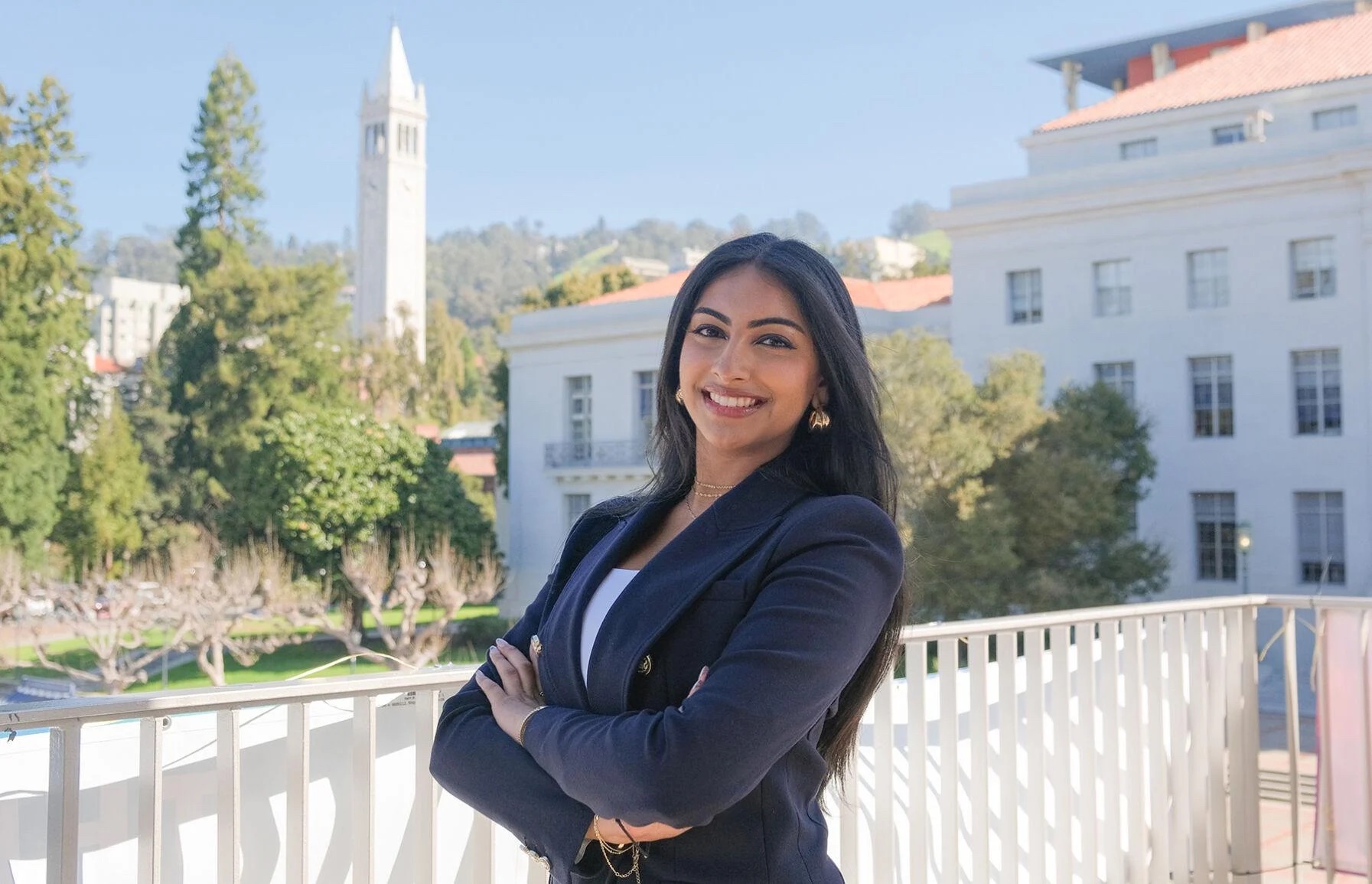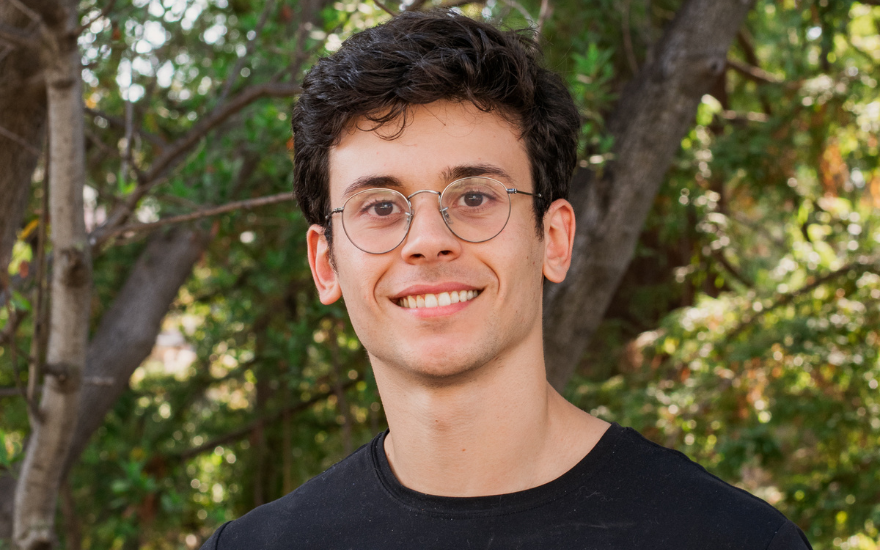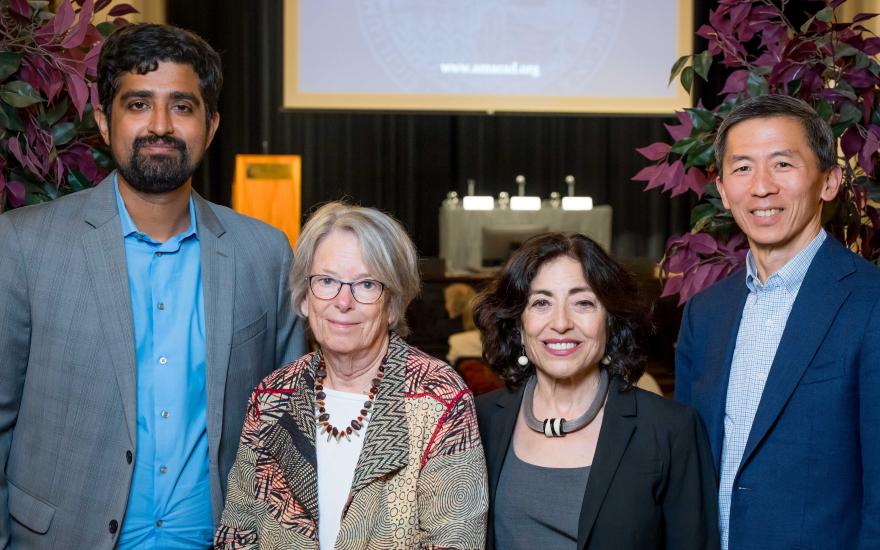Shrinidhi Gopal, a senior majoring in economics and data science, is the incoming president for UC Berkeley's undergraduate student government. She is one of 202 students who made these subjects the second most common combination of majors declared on campus this spring.
Gopal spoke with Berkeley’s College of Computing, Data Science, and Society about how she discovered these fields and the power of combining data science with the social sciences. She also shared how she got involved in student government, what she hopes to accomplish this year and advice for incoming undergraduates. This Q+A has been edited for length and clarity.
How did you decide to attend Berkeley?
I was actually deciding between UC Berkeley and UCLA [UC Los Angeles]. I was offered the Regents’ Scholarship at Berkeley, which is why I chose Berkeley because I also got to go to the Regents’ Overnight Host Program, which was really cool – not in person because it was during COVID-19. But I got to do it virtually. I really liked the campus.
But also something I really loved about Berkeley was the flexibility to take classes and then declare your major. When I applied to college, I applied as a neuroscience major but I knew I was thinking about going into something a little bit more technical. So I also wanted to be at a school where I’d have the opportunity to pursue those different interests.
What inspired you to choose your majors?
For data science, I wanted something that was practical and applicable to the real world. I was thinking about either doing computer science or data science. I personally just felt that data science aligned for me a little bit better because I also like statistics and math.
Right now, my internship is in product management. I did it last summer, too, and it's the perfect integration of econ and data science. On one hand, you're looking at the company's business and how you can align with like companies’ [objectives and key results], but on the other hand, you're also looking at how you can use data from customers to power the company's business. I did that internship last summer, and that solidified it. I was definitely going to commit to data science and economics, because I just love the combination of the two.
That's kind of how I picked, because during my freshman and sophomore year I was trying out different classes and seeing which ones I liked being in.
How do these two majors work together and complement each other?
The internship I'm doing feels like a really good example of how data is powering and connects so much to economics and business. It’s also changing the landscape. We see all these machine learning, natural language processing, large language models – all these new things come up, and they're changing the way that the economy works. They're changing the way that our government works. They're changing everything.
I really think that, in the future, data science is going to be at the heart of almost every single field no matter what field that is, whether it be law, humanities, politics, whatever. There will be some sort of automation, some sort of a data science aspect involved in it. So I just feel like they do go really hand in hand together.
I have yet to take the econ classes that are my cross-listed courses. I'm taking them this year actually. But I have taken some really cool classes that aren't even technically data science or econ classes. They're public policy classes or behavioral economics, and they have a ton of data science involved in them. So I think it's really cool that it's part of everything. It's part of every field. It’s part of every discipline.
You’re also student body president this year. Why did you get involved in that?
I always wanted to do student government. I wasn't involved in it in high school. I really wanted to be, though, and I felt like, at Berkeley, this was finally a time where nobody knew me. It was a time for me to try out everything I wanted to try out, especially at such a huge school.
I joined Cal’s student government, the Associated Students of the University of California (ASUC), as an intern for the Office of the President. That feels so full circle right now. I was so inspired by the then-president [and political economy alumnus] Chaka Tellem. What I really admired about him was that his office encompassed so many different aspects of campus life, from the response to COVID-19 or student safety and wellness to legal affairs to canvassing.
I was seeing the things that were wrong – the problems that students were facing – and I was like, ‘This is a great place to be in so I can help solve these problems.’ So that's why I joined student government, and that's why I continued in it. I ran for ASUC Senate my freshman year, I ran for vice president my sophomore year, and I ran for president last year.
What are you hoping to accomplish this year as the student body president?
There's so much. One of the big things I did last year – which was a pilot program, and we're working on the details and implementation – was a partnership with LinkedIn. We provided LinkedIn Learning free of cost to all students and premium as a pilot program to a small subset of students. That has definitely been a lot of work. We’re looking to see if we can fully fund that project for all students. If we did, we'd be the first school ever to have this sort of partnership with LinkedIn, to offer premium access free of cost to students.
Another thing I am super excited about was I met with Berkeley Chancellor Rich Lyons, and we were discussing some of my ideas and projects that I wanted to work on. One of the big things that hopefully we're going to partner on with professors is some sort of chatbot. It would be available on CalCentral for students to get answers when you can't find an advising appointment, need help declaring your major, figuring out how to enroll in DSP [the Disabled Students Program], things like that. Berkeley is such a huge school, and there's so many resources that sometimes the problem is connecting students to those resources.
I’m also focused on advocating for more space and funding for student groups. For example, the Latinx Student Resource Center is still not a permanent resource center. I'm working on, as well, getting student performance groups permanent space – safe indoor space – on campus. We have a huge campus with so many students and so many groups that are vying for the same space, but there's definitely underutilized space. So those are some of the projects.
What advice do you have for incoming freshmen and transfer students?
Take all the classes you want to take – anything that sounds even remotely interesting. Don't feel like that major that you put on your application or the major you're maybe going in as is the end all be all. There's so much opportunity for flexibility at Berkeley. It's just so awesome. I'm really, really grateful that I went to Berkeley, especially for that reason.
Second, join all the things you want to. It can be overwhelming for those first couple of weeks when you're getting flyered by a million different people. But I am so thankful for all the different clubs and groups and things I tried – maybe didn't even get into, but just auditioned for or tried out for. The amazing thing about going to such a big school is there's so many activities to be a part of. That's really how you find your community. That's definitely my advice.






